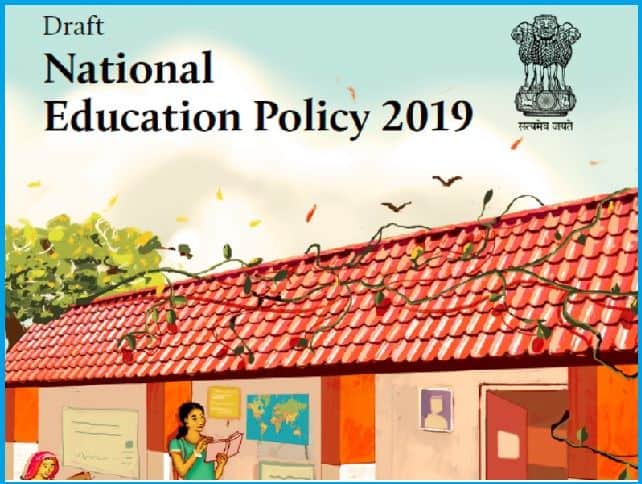 After 34 years, the Indian government replaced the National Policy on Education, framed in 1986, with the New Education Policy of 2020. The NEP, approved by the Union Cabinet, proposed sweeping reforms in both school and higher education, aiming at overhauling India’s education system. The Ministry of Human Resources was renamed as Ministry of Education.
After 34 years, the Indian government replaced the National Policy on Education, framed in 1986, with the New Education Policy of 2020. The NEP, approved by the Union Cabinet, proposed sweeping reforms in both school and higher education, aiming at overhauling India’s education system. The Ministry of Human Resources was renamed as Ministry of Education.
Why NEP?
An NEP is a comprehensive framework to guide the development of education in the country. The first education policy was drafted by a 17-member Education Commission, headed by then UGC chairperson D.S. Kothari. It was in 1964, that Congress MP Siddheshwar Prasad criticised the then government for lacking a vision for education. Based on the suggestions of this Commission, Parliament passed the first education policy in 1968.
The new NEP is the third to date for the country. The first came in 1968 under Indira Gandhi’s rule and the second in 1986, under Rajiv Gandhi’s rule. The NEP of 1986 was revised in 1992 when P.V. Narasimha Rao was Prime Minister. The third is the NEP released this week under the Prime Ministership of Narendra Modi.
All the courses, right from school to higher education, will lay focus on practical and application knowledge.
KEY TAKEAWAYS OF NEP, 2020
Schooling begins at the age of 3 years
The NEP expanded mandatory schooling age from 6-14 years to 3-18 years. The NEP introduced included three years of pre-schooling (done during age group of 3-6 years) under the school curriculum. As per the new system, the new system will have 12 years of schooling with three years of Anganwadi/ pre-schooling.
The new policy also lays emphasis on Early Childhood Care and Education (ECCE). Prior to the age of 5 years, every child will move to a preparatory class or “Balavatika”, which will have an ECCE-qualified teacher.
The new policy replaced the 10+2 structure of school curriculum with 5+3+3+4 curricular structure, corresponding to ages 3-8 years (foundational stage), 8-11 (preparatory), 11-14 (middle), and 14-18 years (secondary) respectively. The mid-day meal programme will be extended to pre-school children.
Each of the four stages of school education, may consider moving towards a semester or any other system that allows the inclusion of shorter modules. Exams will also be semester-wise.
During school education, the government decided to include vocational training courses from middle school (Class VI) only, where students will also be given a chance to intern for around 10 days. Coding will also become a part of the school curriculum.
From Classes VIII to XI, students can choose subjects.
Medium of instruction should be in mother tongue
The NEP laid stress on students’ mother tongue as the medium of instruction even as it stuck to the ‘three language formula’ but also mandated that no language would be imposed on anyone. The NEP only recommends the mother tongue as medium of instruction, and not make it compulsory.
The policy states that children learn and grasp non-trivial concepts fast in their home language.
The central government will design a new basic learning programme for parents to teach children up to 3 years at home and for pre-school kids, aged 3-6 years.
Importance of board exams to get reduced
In order to reduce the importance of board exams, it will be conducted in two parts: objective and descriptive. Exams can be conducted twice a year. Board exam is supposed to promote knowledge application rather than rote learning. Further, annual examinations will be held only at the end of classes III, V and VIII.
Bagless days will be encouraged throughout the year for various types of enrichment activities involving arts, quizzes, sports, and vocational crafts.
Subjects such as physical education, arts and crafts, vocational skills, in addition to science, humanities and mathematics will be incorporated throughout the school curriculum.
Students will get 360 degree holistic report card, which will not only inform about the marks obtained by them in subjects, but also their skills and other important points.
UG degree courses to have multiple exit options
The undergraduate degree courses can be of either 3 or 4-year duration, with multiple exit options. If a student completes one-year of education in a discipline or field, including vocational and professional areas, he/she can get a certificate, diploma after completion of 2nd year, or a Bachelor’s degree after a 3-year programme. The 4-year multidisciplinary Bachelor’s programme, however, shall be the preferred option.
There will be a multi-disciplinary, flexible choice of major and minor subjects, for all courses. Student can major in Physics and have Fashion Design/Music as minor.
Students can resume degree courses after dropping out without the need to start afresh.
The government will also establish an Academic Bank of Credit for digitally storing academic credits earned from different HEIs so that these can be transferred and counted towards final degree earned.
University education
The NEP introduced one-year master’s courses, abolished the MPhil programme, offered university students a wider choice in choosing their subject combinations, and allowed them to do parts of their courses from different universities. Foreign players, top 100 universities across the world, will be allowed to set up their campuses in the country. However, the parameters have not been elaborated.
Curriculum content will be reduced in each subject to its core essentials, and make space for critical thinking and more holistic, inquiry-based, discovery-based, discussion-based and analysis-based learning.
The National Testing Agency (NTA) will offer a high-quality common aptitude test, as well as specialised common subject exams in sciences, humanities, languages, arts, and vocational subjects, at least twice every year for university entrance exams.
There will a common entrance test for all the universities across the country. A National Research Foundation will also be set up.
The education sector will get 6% of GDP against the earlier 1.7%.
UGC, AICTE to be merged
A single regulator for higher education, Higher Education Commission of India (HECI) will be set up, excluding medical and legal education. Public and private higher education institutions will be governed by the same set of norms for regulation, accreditation and academic standards. The government will phase out the affiliation of colleges in 15 years and a stage-wise mechanism will be established for granting graded autonomy to colleges.
No strict separation of Science, Arts, Commerce
Under NEP 2020, there will be no rigid separation between arts and sciences, between curricular and extra-curricular activities, between vocational and academic streams. Students can select subjects of their choice across any stream.
Should states strictly follow the NEP?
The NEP is a broad direction and is not mandatory to follow. Since education is a concurrent subject (both the Centre and the state governments can make laws on it), the reforms proposed can only be implemented collaboratively by the Centre and the states.
The changes cannot be witnessed immediately. The BJP government has set a target of 2040 to implement the entire policy. Sufficient funding is crucial for its implementation. It may be recalled that the 1968 NEP was hamstrung by shortage of funds.
The NEP aims at lofty goals but when it comes to implementation, there are a lot many hurdles that need huge funds and many years for streamlining.
























